Key takeaways
- Portland Writers Community offers a supportive environment that fosters creative growth through workshops and connections among diverse writers.
- Literary arts organizations serve as crucial platforms for giving voice to diverse stories, promoting accessibility and nurturing community involvement.
- Volunteering enhances personal skills beyond writing, cultivating a sense of belonging and opening unexpected networking opportunities.
- New volunteers are encouraged to start small, ask questions, and embrace challenges as valuable learning experiences in their literary journey.
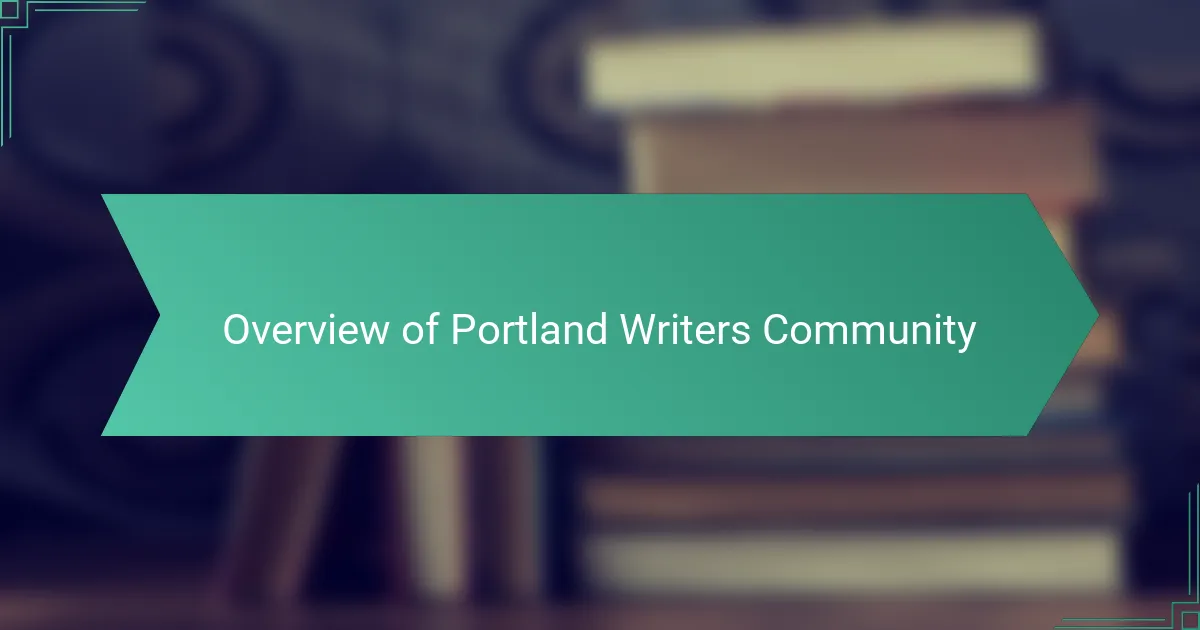
Overview of Portland Writers Community
Portland Writers Community feels like a warm, welcoming space where creativity flows naturally. When I first joined, I was amazed at how diverse the group was—everyone from poets to novelists to screenwriters, all sharing their passion for words. Have you ever experienced that instant connection with strangers just because you all speak the language of stories?
What stands out most to me is the genuine support and encouragement. I remember bringing a rough draft to a workshop, expecting polite nods, but instead, I received thoughtful critiques that made me rethink my entire approach. It’s not just about improving your writing; it’s about growing alongside people who truly care about your voice.
The community also hosts events that feel more like gatherings of old friends than formal meetings. Each session sparks new ideas and motivation, leaving me energized and eager to write more. Isn’t it incredible how just being around passionate writers can reignite your own creative fire?
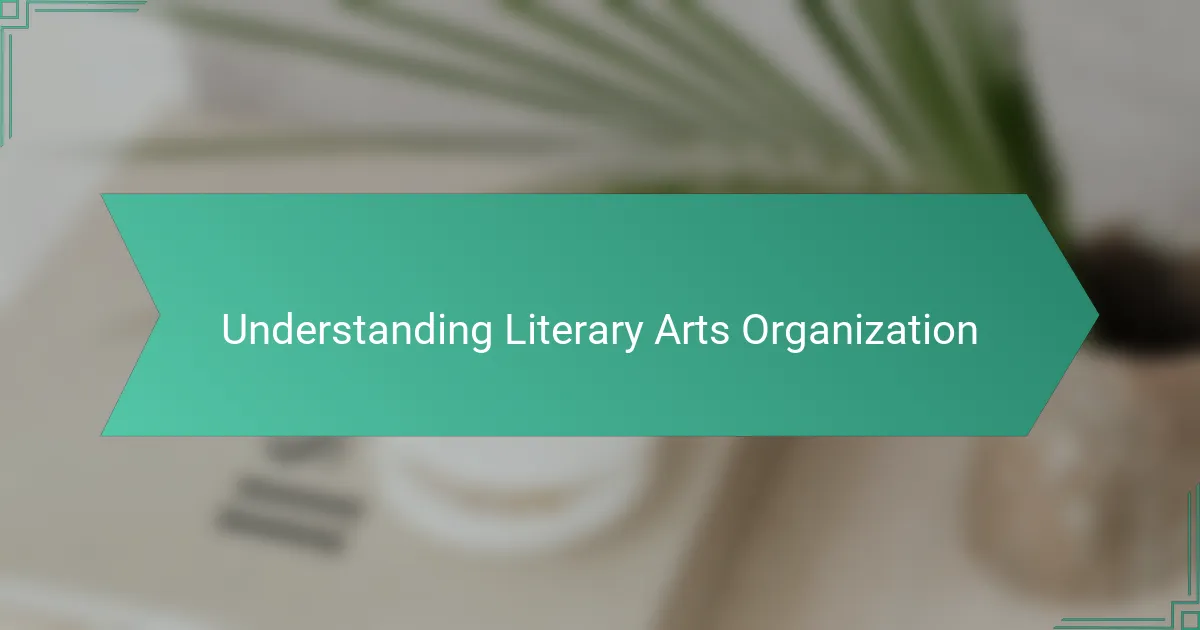
Understanding Literary Arts Organization
Understanding Literary Arts Organizations means recognizing how they serve as vital hubs for writers like us. When I first explored one, I was struck by how their mission goes beyond simply promoting literature—they cultivate spaces where stories find both voice and audience. Have you ever noticed how these organizations breathe life into pages and turn words into shared experiences?
What I appreciate most is their dedication to accessibility. I remember attending a community reading hosted by such an organization, where diverse voices were highlighted, making me feel like my own stories belonged in the wider literary world. It’s powerful to witness how they break down barriers, inviting everyone to participate in the cultural conversation.
These organizations often act as creative catalysts, offering workshops, grants, and events that push writers out of their comfort zones. From what I’ve seen, they don’t just support individual growth—they foster connections that ripple through the entire literary landscape. How inspiring is it to be part of something that shapes not only your craft but also your community?
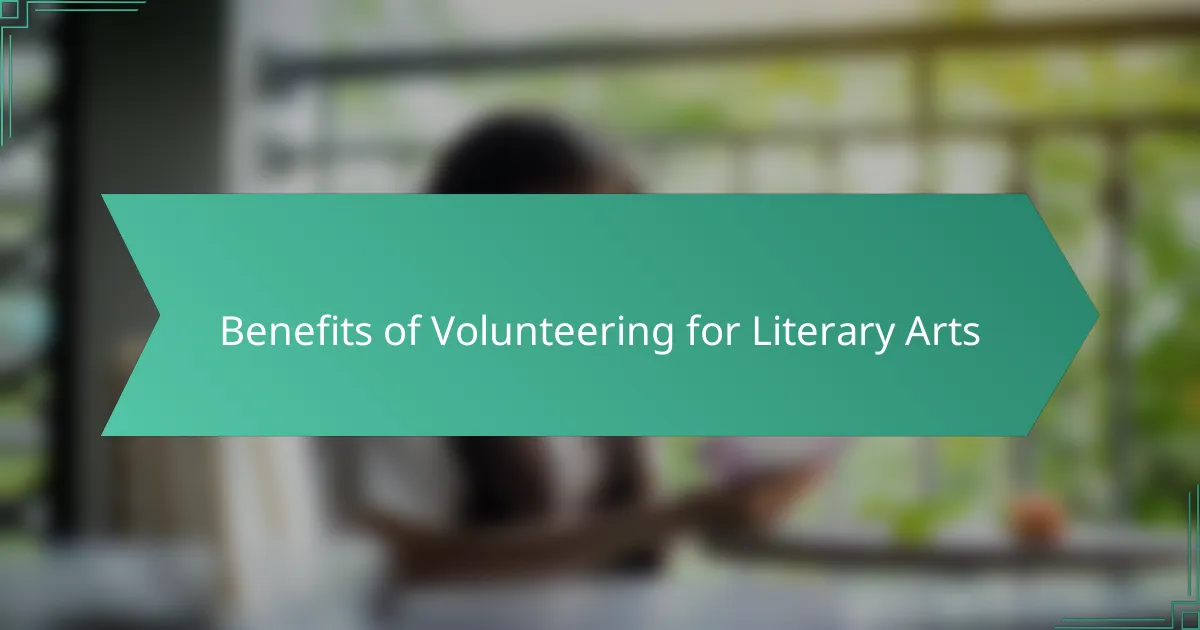
Benefits of Volunteering for Literary Arts
Volunteering for Literary Arts opens doors to experiences that deeply enrich your writing journey. When I first volunteered, I found myself more connected—not just to the craft but to people who share the same passion. Have you ever felt how being part of something bigger fuels your creative spirit?
One of the best perks I discovered is the chance to sharpen skills beyond writing. Organizing events or helping with workshops taught me communication and leadership in ways I hadn’t anticipated. It’s rewarding to see how these skills spill over and improve my writing process too.
Plus, volunteering creates a circle of support that feels like an extended family. Sharing the workload and celebrating each other’s successes builds a sense of belonging. Isn’t it amazing how giving your time can bring back so much more than you expected?
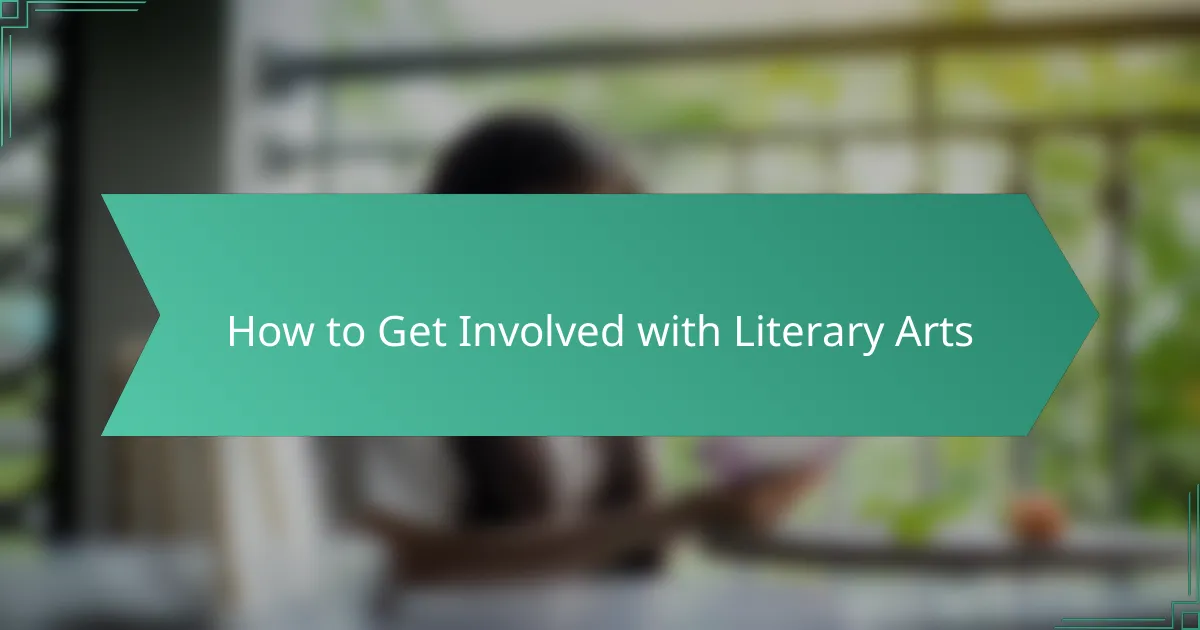
How to Get Involved with Literary Arts
Getting involved with Literary Arts in Portland is more approachable than you might think. I started simply by attending one of their reading events—no pressure, just soaking in the atmosphere. Have you ever noticed how just being present at these gatherings can spark a desire to dive deeper?
From there, I reached out to volunteer for small tasks like event setup or welcoming attendees. It was a low-key way to ease into participation, and honestly, those moments of handing out programs or chatting with fellow attendees made me feel instantly part of a larger story. What surprised me was how those brief interactions naturally led to more meaningful roles, like helping organize workshops.
If you’re wondering where to begin, I’d suggest visiting the Literary Arts website or signing up for their newsletter. They regularly post volunteer opportunities and upcoming events. Don’t underestimate the power of simply saying “yes” when that first call to help comes—sometimes it’s the key to unlocking a whole new creative circle.
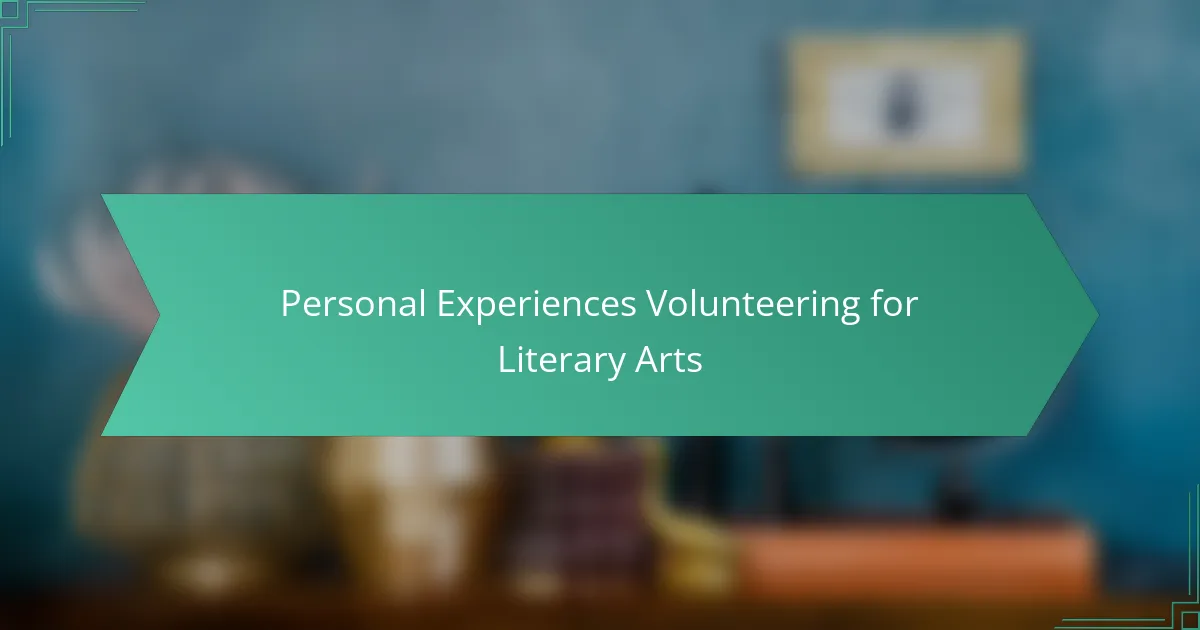
Personal Experiences Volunteering for Literary Arts
Volunteering for Literary Arts has been one of the most eye-opening experiences in my writing journey. I still remember the first time I helped at a poetry reading—standing behind the scenes, watching the room fill with attentive listeners. Have you ever felt that quiet thrill of knowing you’re part of a moment where stories truly come alive?
There was also a time when I coordinated a small workshop, nervously managing last-minute changes while trying to stay calm. That experience taught me resilience and the joy of collaboration, reminding me that the literary community is as much about teamwork as it is about solo creativity. It’s amazing how those behind-the-scenes moments deepen your connection to the craft and the people who shape it.
What’s struck me most about volunteering is the way it opens unexpected doors. By simply showing up and offering my time, I met writers I deeply admire and made friendships I cherish. Have you noticed how giving back often returns far more than you put in? For me, volunteering became a pathway not just to grow as a writer, but to belong.
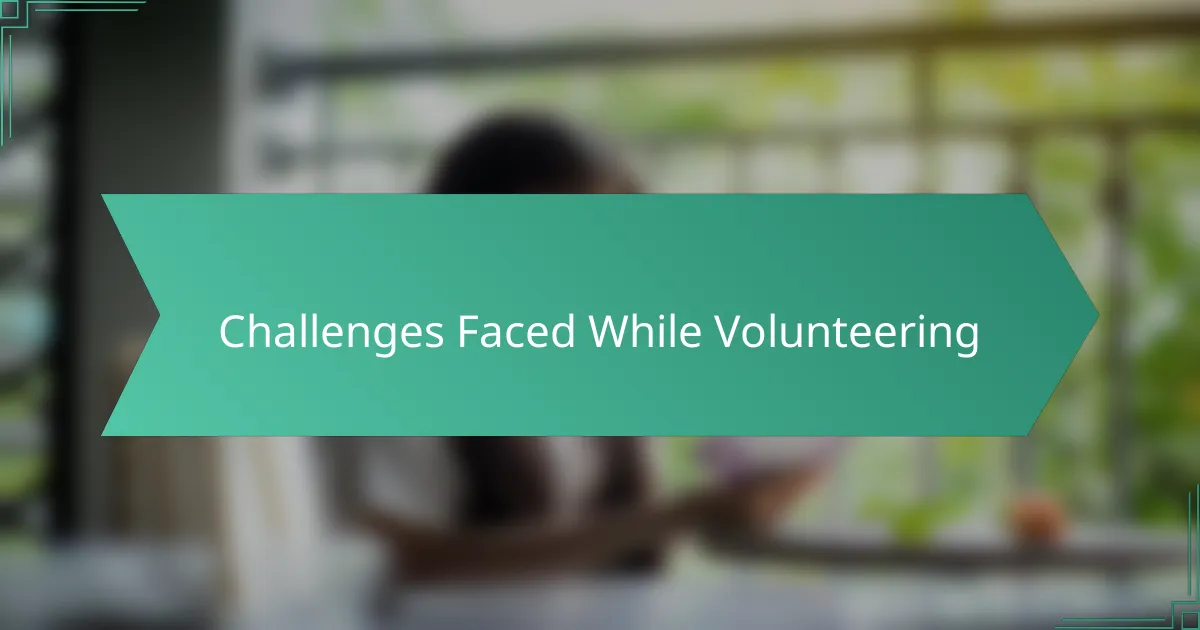
Challenges Faced While Volunteering
Volunteering for Literary Arts hasn’t always been smooth sailing. I remember feeling overwhelmed the first time I juggled multiple tasks during a busy event, questioning if I was doing enough or simply stretched too thin. Have you ever taken on something with great enthusiasm, only to realize it’s more demanding than you imagined?
Another challenge I faced was balancing my own writing time with volunteer responsibilities. It’s tricky because while you want to support the community, the clock keeps ticking on your personal projects. How do you find that sweet spot between giving to others and nurturing your own creative work?
Sometimes, communication hiccups sneak in too—whether it’s unclear instructions or last-minute changes—that test your patience and adaptability. Yet, those moments have taught me so much about flexibility and the true meaning of teamwork. Isn’t it interesting how challenges often bring the best lessons?

Tips for New Literary Arts Volunteers
One tip I always share with new literary arts volunteers is to start small and build your way up. When I first volunteered, I took on simple tasks like greeting attendees or organizing materials. This low-pressure entry helped me feel confident and connected before diving into more complex roles. Have you ever noticed how easing in makes the experience less intimidating and way more enjoyable?
Another thing I’ve learned is the importance of asking questions. At one event, I found myself unsure about the schedule, so I reached out to a coordinator. That conversation not only clarified my role but also introduced me to people who became key part of my volunteer journey. Don’t hesitate to speak up—chances are, someone else has the same questions and your initiative smooths the way for everyone.
Lastly, I suggest embracing the unexpected moments. Volunteering rarely follows a perfect script—technical glitches or last-minute changes always pop up. Early on, I remember juggling surprise tasks during a reading event, and though it felt chaotic, it was also incredibly rewarding. Isn’t it funny how those challenges can turn into the most memorable parts of volunteering?